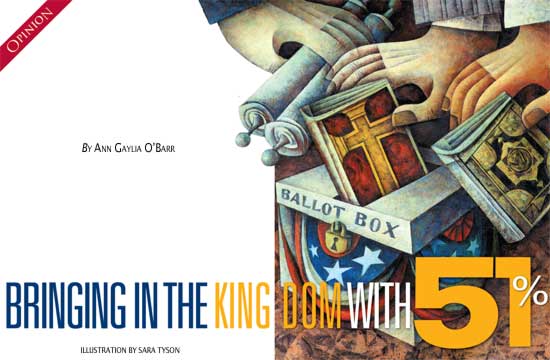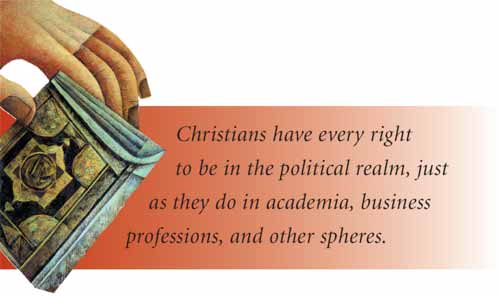Bringing in the Kingdom with 51%
Ann Gaylia O’Barr November/December 2005
Getting your Trinity Audio player ready...

My hometown newspaper recently published a letter entitled "Christians Will Retake the Nation." The writer made statements such as: "Once again the voice of the Christian is heard in the land, and it frightens those whose letters drip with hate. They are frightened of us . . . . Christians have once again found their voices and have begun to assert their right as the majority to govern themselves."
The media has gone into overtime discussing the "value voter." Letters and essays have flooded our national and local periodicals, many, of course, expressing views quite different from those in the quoted letter. Many claim they are appalled at the manner in which "red state" values are put to the fore.
The battle to be "in the majority" appears joined, but what do we mean by that phrase? Further, if, as the writer of the letter maintains, we Christians now have political power, what should be our attitude toward this paradigm?
By saying "majority status," we are immediately talking about power. How much do we agree with Lord Acton's oft-quoted statement that "power tends to corrupt, and absolute power corrupts absolutely"? Is not power a two-edged sword, offering both opportunity and danger? And just how do we wield it without being corrupted by it?
I think we can answer these questions only if we first make a distinction between our civil institutions, rightly cherished as they should be, and our biblical calling. The U.S. Constitution is, of course, not the Ten Commandments, nor is representative government to be equated with the kingdom of God. Representative government (popularly known in the U.S. as democracy), like any worldly system, is flawed. In the perfect world to come, God will be absolute ruler. Democracy will not be needed.
Democracy is a form of government developed over centuries. It provides a mechanism for the average person to deal with an imperfect, self-centered, and at times cruel world. It helps ensure that power is not wielded by one person or an elite group. Power, however, is still power, with all its temptations. Majority rule can disperse power, but who is to guarantee that the majority is always right?
As democracy or the promise of it has spread far from its roots in the West, others are asking this question: What does the majority do with its power, especially in terms of religious practice?
What shall Muslims in Kosovo do? Iraqi Shiites? Indian Hindus? If American Christians can mold their country to their liking, cannot Hindus make Hindu religious practice the norm for India, perhaps causing discomfort for minorities such as Indian Christians?
Some countries have for centuries been guided by Koranic law and practice, and the majority of the citizens seem happy with the arrangement. As more representative forms of government take hold in some of these countries, do we expect this satisfied majority to allow more freedom for Christian minorities?
Some values that have become embedded in the fabric of Western nations are not the result of majority rule. For example, slavery was abolished in the U.S. only after Southern states had seceded and a Civil War had begun. Prior to that war, the U.S. Supreme Court appeared to condone slavery. The Dred Scott case of 1857 treated slaves as mere property—permitting slavery in any of the country's territories. This decision angered those who believed slavery a terrible evil, and the anger helped fuel the Civil War.
In his book For the Glory of God, Rodney Stark argues for the decisive influence of Christianity on the abolition of slavery. According to him, only in Christian regions did the idea eventually develop that slavery was wrong. However, the disappearance of slavery was an even slower process of several centuries in countries ruled by kings and nobles, not by democratic institutions.

Jesus' call to radical living has exerted a profound influence on this world. Over the centuries Christianity has been an unprecedented force for good. Christians have not traversed history's road in a straight line, however. They have known a number of detours and holding patterns.
When Christianity was adopted by Const-antine and the Byzantine Empire, beginning in the fourth century, the church became a partner with the government. As the Byzantine Empire became theocratic, groups with views different from those deemed orthodox by the state were hounded, even persecuted. Thus when Islam appeared in the seventh century, some Christians welcomed Islamic rulers as more tolerant than Christian ones.
As Christianity in Europe became Christendom, kings and popes sparred with each other. Though most gave lip service to Jesus, the Christian religion for the average man and woman was a mere cultural appendage, saints replacing pagan religious figures. Popes, playing power games with secular kings, often became as corrupt as the kings. Along the way the religion whose Founder forbade His followers to take up the sword for Him witnessed "Christian" military crusades in His name. These so-called Christian Crusaders left us with the bitter legacy we still deal with.
However, even in those times small Christian groups took Christ's teachings to heart. These movements bore different fruit. The influence of John Wycliffe, John Huss, and others reached far beyond their numbers and times.
Compare the legacy of these Christians with the legacy of the Crusaders. The prophet Muhammad had a genuine desire to rid the Arabian Peninsula of polytheism, of the many gods worshipped instead of Allah, whom Muhammad worshipped as the one true God. Muhammad himself led armies and killed people in an effort to carry out Allah's will, as he saw it. Aren't those Christians who would use force today showing themselves the inheritors of Muhammad and medieval Crusaders, both Muslim and Christian, rather than of Jesus? If we have a theocratic government, with no separation of church and state, how will we be following the pattern Jesus laid down? Jesus forbade His followers to use the sword in His defense, and went to the cross rather than ask His Father to send down legions of angels to save Him.
We Christians would do well to remember that we are called to be in the world but not of it. Thus, we are to coexist with Caesar. Neither Jesus nor Paul called for military revolution against Caesar. In fact, on occasion Paul used his Roman citizenship to advantage in his missionary travels. We are to use the opportunities the world offers us when they serve the cause of Christ. However, we should be as wary of allying with this democratic Caesar as with any other.
We Christians should enter every realm open to us. Not only should we enter every profession; we should strive to be the best that we can. "Whatsoever ye do, do it heartily, as to the Lord, and not unto men" (Colossians 3:23). We will be respected not just because we are Christians, but also because we perform well.
Christian athletes have served as wonderful examples for the sports-minded. It does not serve the cause of Christ, however, if Christians try to excel in sports without talent and training. They gain no respect because they are Christians if they are not first good athletes.
We may rest easier if we know that the pilot of our plane is a Christian, but we should be concerned first that he or she is adequately trained. It is the same with our doctor and our lawyer. Yes, we prefer that those who serve us be Christians—but first, let them be skilled in their professions.
We should look at the values held by political candidates. Those values will be a part of what we want in a leader. However, simply being a professing Christian is not in itself a guide as to how well he or she will do in office. Will this person have the skill and experience to advance these values as well as to effectively govern in this pluralistic society?
Christians have every right to be in the political realm, just as they do in academia, business professions, and other spheres. We become guilty of the world's turf fighting, however, if we vote candidates into office solely because they agree with our religious persuasion. Such practice smacks of tribalism.
Should we not "vote our values"? Vote for candidates who are pro-life and pro-family? Certainly, we Christians have every right and, indeed, the obligation to become active politically, to vote, and to act according to our Christian convictions when elected. The problem comes when we believe we can bring in God's kingdom solely by the ballot box or by "stacking" the Supreme Court to reinterpret things the way we want them.
Remember the Eighteenth Amendment? Ratified in 1919, it prohibited intoxicating beverages. A backlash against it, however, led to its repeal in 1933.
Lesson: When a significant percentage of a population does not agree with a law, the law tends to be ignored. Simply coming up with a temporary majority to pass laws can be counterproductive. Christian values must percolate through a society's culture for its laws to be both moral and effective.
We should not be misled by polls showing that a high percentage of Americans believe in God or even in the Christian way of life. Some of the same people who profess these views tune in to television shows hardly in harmony with the Christian way of life. They may tell the pollster that they do not believe in abortion or gay marriage, but they engage in orgies of consumerism just like their pagan neighbors.
Christians will not succeed in bringing in God's kingdom by using democracy or any other form of government. They will succeed by living lives that evince love, compassion, mercy, self-discipline, and responsibility. The world must see Christians as offering both reasoned persuasion and a radical, breathtakingly different way of living.
I was once in a Bible study class in which a young man vigorously assailed the apostle Paul for not condemning slavery in his letter to Philemon. The young man was unhappy because Paul sent Onesimus back to Philemon, presumably with the master/slave relationship intact.
In fact, the letter to Philemon contains seeds for the destruction of slavery, much more potent than a simple condemnation. How can slavery endure if master and slave are brothers in Christ? No laws are then needed to abolish slavery. It withers on the vine under such a new relationship.
In that time of power wielded by emperors and armies, the lives and values of Christians were nothing short of a revolution, but it was a revolution opposed to violence. Democracy may offer opportunities not enjoyed by the early Christians, but the call to radical living for the Christian remains as revolutionary and as necessary today as it was in Paul's time.
Early Christians lived in a world of appalling cruelty and inequality. They did not change that world by forcing their neighbors to live as they lived. They changed that world by having something that their neighbors saw and wanted—shown by powerful example and persuasive argument.
___________________________
Ann Gaylia O'Barr was a foreign service officer with the U.S. State Department for 14 years, serving in such places as Saudi Arabia, Tunisia, Algeria, Canada, and the United States—giving her a firsthand look at how various countries relate to religion. She writes from Langley, Washington.
___________________________